| Listing 1 - 10 of 24 | << page >> |
Sort by
|
Book
ISBN: 9783036957852 3036957855 Year: 2019 Publisher: Zürich: Kein & Aber,
Abstract | Keywords | Export | Availability | Bookmark
 Loading...
Loading...Choose an application
- Reference Manager
- EndNote
- RefWorks (Direct export to RefWorks)
"Alfred ist der jüngste Nachfahre der von Ärmels, doch die glanzvollen Zeiten der Familie sind vorbei. Neben seiner umschwärmten, aber abgedrehten Mutter, seinem genialen Bruder und seinem kauzigen Vater fühlt er sich wie eine Karikatur. Trotzdem hat er es sich zur Aufgabe gemacht, seine alteingesessene Familie zu neuem Ruhm zu führen. Ein Held möchte er werden. Dazu hat er verschiedene Möglichkeiten: Er könnte, wie sein Vorbild und Namensvetter, vierzig Franzosen erschlagen, einen Gesangswettbewerb gewinnen oder zusammen mit Ruth ein Hotel aufmachen, denn ja, die Liebe siegt immer! Doch ist Alfred wirklich zum Helden geboren?" -- Dust jacket
Bildungsromans --- Apprenticeship novels --- Bildungsroman --- Bildungsromane --- Coming of age --- Coming-of-age novels --- Entwicklungsromane --- Erziehungsromane --- Fiction --- German literature --- Bildungsromans.
Book
ISBN: 0585351023 9780585351025 0872497925 9780872497924 Year: 1991 Publisher: Columbia, S.C. University of South Caroina Press
Abstract | Keywords | Export | Availability | Bookmark
 Loading...
Loading...Choose an application
- Reference Manager
- EndNote
- RefWorks (Direct export to RefWorks)
Bildungsromans. --- Bildungsromans --- Literature - General --- Languages & Literatures --- Bildungsroman --- Apprenticeship novels --- Bildungsromane --- Coming of age --- Coming-of-age novels --- Entwicklungsromane --- Erziehungsromane --- Fiction --- History and criticism. --- History and criticism
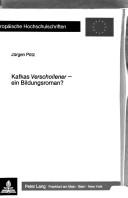
ISBN: 3820478272 Year: 1983 Publisher: Frankfurt am Main Lang
Abstract | Keywords | Export | Availability | Bookmark
 Loading...
Loading...Choose an application
- Reference Manager
- EndNote
- RefWorks (Direct export to RefWorks)
Maturation (Psychology) in literature --- Psychological fiction --- -Bildungsromans --- -Apprenticeship novels --- Bildungsroman --- Bildungsromane --- Coming of age --- Coming-of-age novels --- Entwicklungsromane --- Erziehungsromane --- Fiction --- History and criticism --- Kafka, Franz --- Bildungsromans --- Maturation (Psychology) in literature. --- History and criticism. --- Kafka, Franz, --- -History and criticism
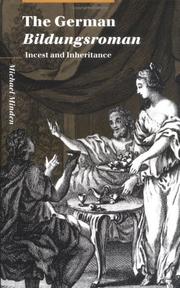
ISBN: 0511006039 9780511006036 0521495733 Year: 1997 Publisher: Cambridge New York Cambridge University Press
Abstract | Keywords | Export | Availability | Bookmark
 Loading...
Loading...Choose an application
- Reference Manager
- EndNote
- RefWorks (Direct export to RefWorks)
"The Bildungsroman - the story of the development or formation of a young man - is the most famous German contribution to the European novel. Most studies of the Bildungsroman have concentrated on its underlying philosophy; Michael Minden addresses it as literature. He offers detailed readings of some of the best-known novels in the German language, from Goethe to Mann, including Wilhelm Meisters Lehrjahre, Agathon, Anton Reiser, Hyperion, Heinrich von Ofterdingen, Der grune Heinrich, Der Nachsommer and Der Zauberberg. Looking at the novels from the points of view of gender, subjectivity and ideology of the aesthetic, and taking account of late-twentieth-century literary theory, Minden uncovers aspects and motifs which subvert traditional ideas of the Bildungsroman and raise questions about the function and status of literature."--Jacket.
Bildungsromans. --- German fiction --- Bildungsromans, German --- Bildungsromans --- Germanic Literature --- Languages & Literatures --- Apprenticeship novels --- Bildungsroman --- Bildungsromane --- Coming of age --- Coming-of-age novels --- Entwicklungsromane --- Erziehungsromane --- Fiction --- German Bildungsromans --- History and criticism. --- History and criticism --- Goethe, Johann Wolfgang von,
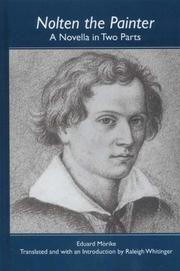
ISBN: 1281741361 9786611741365 1571136665 1571133127 Year: 2005 Publisher: Rochester, N.Y. : Camden House,
Abstract | Keywords | Export | Availability | Bookmark
 Loading...
Loading...Choose an application
- Reference Manager
- EndNote
- RefWorks (Direct export to RefWorks)
When one thinks of German artist-novels and 'Bildungsromane,' works long available in translation come to mind-by Goethe, Novalis, Hoffmann, Stifter, Keller, or more recently by Mann, Kafka, Musil, or Grass. Yet Eduard Mörike's provocatively subtitled 'Maler Nolten: Novelle in zwei Teilen' (Nolten the Painter: A Novella in Two Parts, 1832) has remained neglected and misunderstood, and until now has never been translated into English, despite its obvious ties to other artist-novels and its striking modernity in playing with conventions of narrative authority and heroic identity. Witness the subtle irony of the opening sequence, in which the narrator is subverted by hints at his own clumsiness and intimations about the dire truths that lurk behind the protagonist Nolten's relationships to his male friends and to the seductive yet somehow frightening women in his life. Or the interplay between the narrator's attempts to make sense of Nolten's complex inner motivations in his loves and art and the ludicrously pompous pathos with which Nolten persists in speaking and thinking, as he concocts a heroic persona caught up in passion, intrigue, and tragedy. Fascinating too is the mysterious trail of the 'Grenzgänger,' or border-line characters, with their hints at the dimension of 'Gypsies, Tramps, and Thieves' that seems to threaten and at the same time to foster the complex unfolding of the realities of life and art that defy Nolten's all-too-artful 'mastery.' Raleigh Whitinger is professor in the Department of Germanic Languages at the University of Alberta.
Bildungsromans, German. --- German Bildungsromans --- German fiction --- Mörike, Eduard, --- Mërike, Ė., --- Molike, Aidehua, --- Möricke, Eduard, --- LITERARY CRITICISM / General. --- Bildungsromane. --- Eduard Mörike. --- German Artist-Novel. --- Gypsies. --- Heroic Identity. --- Narrative Authority. --- Raleigh Whitinger. --- Thieves. --- Tramps. --- Morike, Eduard,
Book
ISBN: 1925360938 9781925360936 192536092X 9781925360943 1925360946 Year: 2018 Publisher: Perth : Magabala Books,
Abstract | Keywords | Export | Availability | Bookmark
 Loading...
Loading...Choose an application
- Reference Manager
- EndNote
- RefWorks (Direct export to RefWorks)
Rob; (and his brother Pen) white Aussies. Rob is completing Year 12, going to schoolies, working as an apprentice in his dad's company and loves his dog, Nig. Rob believes real men take risks.Pen; fifteen-years-old, storyteller, graffiti artiste extraordinaire with a penchant for male anatomy. Pen is liked by everyone. Pen and Benny Boy are mates.Benny Boy; fifteen-years-old, Aboriginal, loves drawing, fishing and living with his awesome (white) foster Nan. Benny Boy doesn't trust Rob.Jack; white, male, finishing Year 12, new to the area, from the bush and adopted into an Aboriginal family. Jack has met Pen and reckons he's a funny bugger. He has also just signed up as an apprentice working alongside Rob-the-knob.Brontide is a coming of age story about four boys and their lot in life. Recounted through storytelling sessions at their school over a period of five days, these boys chronicle their lives. They are at times demanding, occasionally rude, always funny and unexpectedly profound. The boys like to challenge themselves and the rules, and soon realise that not everything goes to plan...
Coming of age --- Teenagers --- Boys --- Indigenous peoples --- High schools --- Apprenticeship novels --- Bildungsroman --- Bildungsromane --- Coming-of-age novels --- Entwicklungsromane --- Erziehungsromane --- Fiction --- Aboriginal peoples --- Aborigines --- Adivasis --- Indigenous populations --- Native peoples --- Native races --- Ethnology --- Children --- Males --- Young men --- Bildungsromans.

ISBN: 0521495733 Year: 1997 Volume: *4 Publisher: Cambridge : Cambridge university press,
Abstract | Keywords | Export | Availability | Bookmark
 Loading...
Loading...Choose an application
- Reference Manager
- EndNote
- RefWorks (Direct export to RefWorks)
"The Bildungsroman - the story of the development or formation of a young man - is the most famous German contribution to the European novel. Most studies of the Bildungsroman have concentrated on its underlying philosophy; Michael Minden addresses it as literature. He offers detailed readings of some of the best-known novels in the German language, from Goethe to Mann, including Wilhelm Meisters Lehrjahre, Agathon, Anton Reiser, Hyperion, Heinrich von Ofterdingen, Der grune Heinrich, Der Nachsommer and Der Zauberberg. Looking at the novels from the points of view of gender, subjectivity and ideology of the aesthetic, and taking account of late-twentieth-century literary theory, Minden uncovers aspects and motifs which subvert traditional ideas of the Bildungsroman and raise questions about the function and status of literature."--Jacket.
German literature --- Fiction --- Thematology --- anno 1800-1999 --- Bildungsromans --- German fiction --- History and criticism. --- Bildungsroman --- Roman éducatif --- 830-31 --- -Bildungsromans --- -830-31 Duitse literatuur: roman --- Duitse literatuur: roman --- Apprenticeship novels --- Bildungsromane --- Coming of age --- Coming-of-age novels --- Entwicklungsromane --- Erziehungsromane --- History and criticism --- Goethe, Johann Wolfgang von --- 830-31 Duitse literatuur: roman --- Goethe, Johann Wolfgang von, --- German fiction - History and criticism.
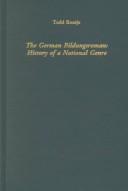
ISBN: 1879751534 Year: 1993 Publisher: Columbia, S.C. Camden House
Abstract | Keywords | Export | Availability | Bookmark
 Loading...
Loading...Choose an application
- Reference Manager
- EndNote
- RefWorks (Direct export to RefWorks)
German literature --- Fiction --- Bildungsromans --- German fiction --- Maturation (Psychology) in literature. --- Psychological fiction, German --- History and criticism. --- -Maturation (Psychology) in literature --- -Bildungsromans --- -Apprenticeship novels --- Bildungsroman --- Bildungsromane --- Coming of age --- Coming-of-age novels --- Entwicklungsromane --- Erziehungsromane --- German psychological fiction --- History and criticism --- -History and criticism --- Maturation (Psychology) in literature
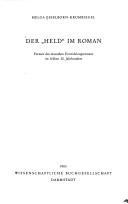
ISBN: 3534089510 9783534089512 Year: 1983 Volume: 39 Publisher: Darmstadt: Wissenschaftliche Buchgesellschaft,
Abstract | Keywords | Export | Availability | Bookmark
 Loading...
Loading...Choose an application
- Reference Manager
- EndNote
- RefWorks (Direct export to RefWorks)
German fiction --- Bildungsroman --- Heroes in literature --- History and criticism --- -Heroes in literature --- Maturation (Psychology) in literature --- Psychological fiction, German --- -Bildungsromans --- -Apprenticeship novels --- Bildungsromane --- Coming of age --- Coming-of-age novels --- Entwicklungsromane --- Erziehungsromane --- Fiction --- German psychological fiction --- German literature --- -History and criticism --- Bildungsromans --- German fiction - 20th century - History and criticism
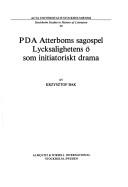
ISBN: 9122008519 Year: 1987 Publisher: Stockholm : Almqvist & Wiksell,
Abstract | Keywords | Export | Availability | Bookmark
 Loading...
Loading...Choose an application
- Reference Manager
- EndNote
- RefWorks (Direct export to RefWorks)
Bildungsromans --- -Apprenticeship novels --- Bildungsroman --- Bildungsromane --- Coming of age --- Coming-of-age novels --- Entwicklungsromane --- Erziehungsromane --- Fiction --- History and criticism --- Atterbom, P. D. A. --- History and criticism. --- -History and criticism --- Atterbom, P. D. A., --- Atterbom (per daniel amadeus) --- Litterature suedoise --- L'ile de la felicite --- Critique et interpretation --- 19e siecle --- Histoire et critique
| Listing 1 - 10 of 24 | << page >> |
Sort by
|

 Search
Search Feedback
Feedback About UniCat
About UniCat  Help
Help News
News